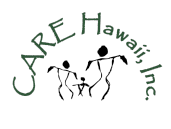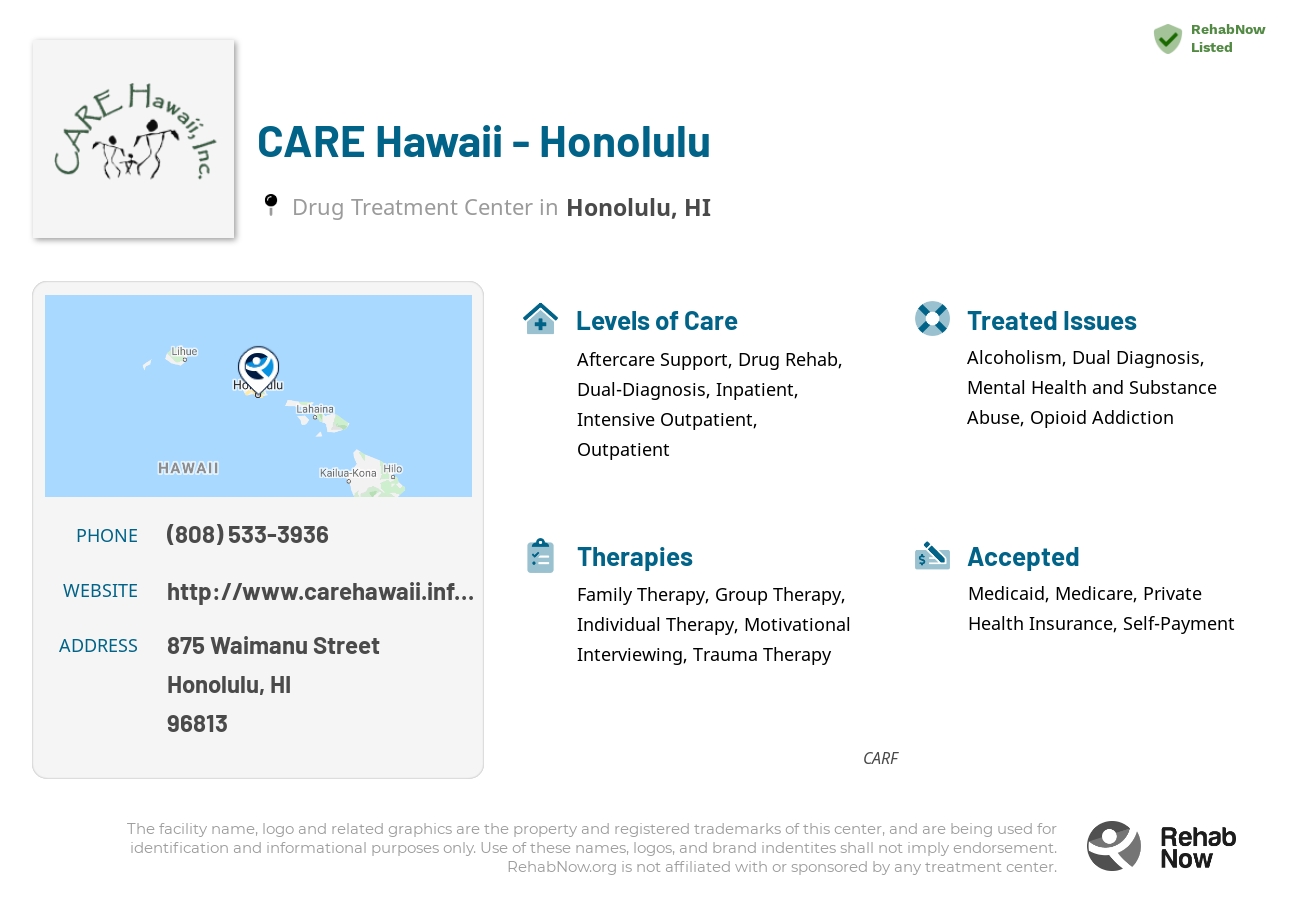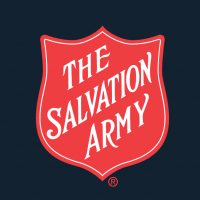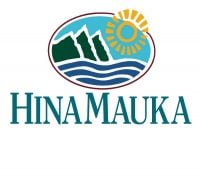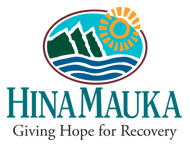CARE Hawaii - Honolulu
Drug Rehab Center in Honolulu, Hawaii
CARE Hawaii is a nonprofit organization that offers various treatment programs to empower individuals struggling with addiction and dual diagnoses, accredited by CARF, and affiliated with programs that provide additional support to clients and families in need.
About CARE Hawaii - Honolulu in Hawaii
CARE Hawaii is a mental health and substance abuse treatment center located in Honolulu, Hawaii. Established in 1999, the facility provides specialized services for adults and adolescents struggling with alcohol, opioid, and drug addiction, along with mental health issues and dual diagnosis. Through its licensed and experienced staff, CARE Hawaii focuses on providing a safe and therapeutic environment for individuals who are in need of care.
Treatment plans are customized to meet each clients’ specific needs. Utilizing evidence-based practices such as family therapy, group therapy, individual therapy, motivational interviewing and trauma therapy, CARE Hawaii provides a variety of levels of care, including inpatient, partial-hospitalization, intensive outpatient, and aftercare support. The facility is accredited by CARF and accepts private health insurance, helping to improve accessibility for those in pursuit of recovery. Other services offered by the center include substance abuse assessments and testing, medication management, peer support, parenting, trauma and PTSD counseling, and more.
Genders
Ages
Modality
Additional
Accreditations

CARF
The Commission on Accreditation of Rehabilitation Facilities (CARF) is a non-profit organization that specifically accredits rehab organizations. Founded in 1966, CARF's, mission is to help service providers like rehab facilities maintain high standards of care.
Conditions and Issues Treated
With so many people addicted to opioids, we need to help those who want to quit. The cycle begins when opioid addicts take opioids for a painful injury. When someone starts taking their medication differently or in excess, it means they’re addicted and at risk of overdosing.
In , detoxing from these types of treatments is the most effective way to beat this. Most facilities begin with medical assistance and then provide counseling services; rehabilitation follows after successful treatment.
Dual diagnosis refers to someone who has both an addiction and a mental or emotional illness. Dual diagnosis treatment includes therapy for both issues simultaneously, allowing for effective treatment of either.
Sometimes people with addiction disorders also have co-occurring disorders like depression, anxiety, bipolar disorder, etc. These require specialized treatment programs that address both drug and alcohol addiction as well as psychiatric illnesses. Some rehabilitation facilities provide patients with co-occurring disorders a program with highly integrated services and a clean, distraction-free environment.
Levels of Care Offered
This center offers a variety of custom treatment tailored to individual recovery. Currently available are Aftercare Support, Drug Rehab, Dual-Diagnosis, Inpatient, Intensive Outpatient, Outpatient, with additional therapies available as listed below.
Inpatient treatment is a form of recovery used in drug rehab. Inpatient recovery offers individual therapy, groups, and family therapy to ensure that the addict has the best recovery possible. A variety of treatments are provided in this type of recovery, depending on what treatment the addict needs at that particular time.
The length of inpatient addiction treatment depends on the addict and their addiction. Inpatient rehabilitation can last anywhere from 30 days to 90 days, depending on how severe the drug abuse is. Inpatient rehab is a costly drug treatment, costing anywhere from $30k- to $60k. However, insurance often offers help in covering these costs.
An intensive outpatient program (IOP) is effective for drug rehab, but it can take six months to several years to complete. It’s the most popular type of drug rehab program in the United States. One example of a successful IOP success story is actor and comedian Chris Rock, sober since 1990.
An IOP allows participants to spend nights at home while attending meetings throughout the day. It’s a good way for drug addicts to make a recovery plan in an outpatient setting while still supporting their loved ones.
Alcohol or drug addiction, or co-occurring disorders, are treated in an outpatient program. The patient must attend therapy and other programs at the facility but can return home each night.
Outpatient treatment allows recovering addicts to live at home while receiving addiction treatment. Outpatients can attend group sessions for a few hours per week. Outpatients may also continue to work full time and study/attend school without interruption if they choose.
The accomplishment of completing a drug or alcohol treatment program is just the first step. Once that is complete, aftercare support comes into play. This includes helping people adjust to life without substances outside of guidelines with assistance like getting sober living accommodations and career counseling and AA/NA programs for those who are struggling between sobriety or want continued help in maintaining it once they have completed their initial rehabilitation at an addiction facility.
Aftercare comprises services that help recovering addicts readjust to normal day-to-day activities while working on specific issues. These problems include psychiatric issues, family problems caused by substance abuse, continuing education pursuits if desired during rehab, etc. These can last up to one year+ depending on what’s needed most urgently upon completion of earlier stages.
Therapies & Programs
Different people react differently to various treatment options. Some drug rehabilitation centers offer individualized treatment that caters to the specific needs of a drug addict. The best treatment option varies on an individual depending on the type of drug abused, life history, medical condition of the person, social circumstances, and the environment they live in now.
When a person enters drug rehab, they usually have anti-drug associations such as withdrawal symptoms, stress, cravings, etc. The first step of drug rehab is to detoxify the body from any residual substances in it. Drug rehabilitation centers usually employ trained medical professionals to help in this process. Usually, the initial detoxification lasts for five days, where the person is monitored under close supervision.
Family therapy sessions typically involve the addict and their family members. During these sessions, a therapist will work with everyone involved to help them understand addiction and find healthy ways of coping without substance abuse.
Some addicts might feel embarrassed about their substance abuse problems. By encouraging family members to attend these sessions, therapists can show addicts that they’re not alone in dealing with addiction. Therapists can also work with family members to help them understand addiction and learn how to offer support and encouragement to their loved one as they deal with substance abuse issues.
Attending group therapy at CARE Hawaii - Honolulu in , is a useful way for those seeking sobriety to realize they aren’t the only one going through it.
This is when a group of people on different recovery phases get together and talk about what they’re going through, their triggers, successes, and failures. This can include alternative types of therapies too! Group therapy may occur on an outpatient or inpatient basis with groups that have no pre-existing relationships outside the session, unlike support groups where everyone already knows each other beforehand.
Trauma therapy is a form of therapy used to help people process and understand past traumas. This can help struggling addicts, as many people turn to drugs or alcohol to mask the pain of their past. Trauma therapy can be done in several ways, such as through visualization, discussion, and writing down thoughts and feelings. The goal is to help the individual understand why they are having problems coping with certain situations and changing how they think and react to things. This is often done in tandem with other therapies to treat the underlying issues associated with addiction.
The idea behind trauma therapy is that while some people can experience traumatic events and not have lasting psychiatric symptoms, many others will. In these cases, memories get hidden from consciousness but continue to influence how the person processes and copes with things in their life. They may avoid situations that resemble what happened or become suddenly angry or irritated to a situation that reminds them of a past event. With the help of a therapist, people can go back over memories and experiences. This helps them understand why they are having problems coping with certain situations and changing how they think and react to things.
Cognitive Behavioral Therapy is a type of psychotherapy that helps people address the thoughts and behaviors that may have led to their addiction. It also helps change negative thoughts into positive ones and promotes healthy communication between addicts and those around them. CBT is an efficient treatment for individuals suffering from all sorts of addictions.
Cognitive Behavioral Therapy (CBT) focuses on the underlying thoughts and behaviors that caused the problem of addiction in the first place and may cause a relapse. Negative feelings are common in drug abuse disorders, but they can lead to co-occurring disorders if not recognized. CBT involves strategies that help to change the behavior pattern by restructuring negative thoughts into positive ones. It helps to remove these feelings, and it provides long-term benefits. Also, CBT promotes self-awareness, self-control and can be administered as a mono-therapy or as part of combination therapy.
Payment Options Accepted
For specific insurance or payment methods please contact us.
Is your insurance accepted?
Ask an expert, call (888) 674-0062
CARE Hawaii Associated Centers
Discover treatment facilities under the same provider.
- CARE Hawaii - Pearl City in Pearl City, HI
- CARE Hawaii - Day Treatment in Hilo, HI
- CARE Hawaii - Outpatient in Lihue, HI
- CARE Hawaii - Kailua Kona in Kailua Kona, HI
- CARE Hawaii - Adolescent Outpatient in Kaneohe, HI
Learn More About CARE Hawaii Centers
Additional Details
Specifics, location, and helpful extra information.
Honolulu, Hawaii 96813 Phone Number(808) 533-3936 Meta DetailsUpdated November 25, 2023
Staff Verified
CARE Hawaii - Honolulu Patient Reviews
There are no reviews yet. Be the first one to write one.
Honolulu, Hawaii Addiction Information
Hawaii has one of the highest rates of drug abuse in the nation. Methamphetamines and marijuana are the most common drugs involved in drug-related crimes in Hawaii. The state loses $500 million every year due to methamphetamine abuse, according to the Hawaii Meth Project. More than 1 million prescriptions for prescription drugs are given out every year.
In 2016, there were 809 drug-related deaths in Honolulu. Heroin was involved in more than half of all overdose deaths in 2016. 6.1 percent of people in Honolulu abused drugs in the past month. In 2015, there were 2,538 admissions to treatment centers for drug abuse in Honolulu. There are many drug treatment facilities in Honolulu, HI that can help you or your loved one get sober.
Treatment in Nearby Cities
- Wahiawa, HI (17.6 mi.)
- Paauilo, HI (182.7 mi.)
- Kapaau, HI (151.8 mi.)
- Waialua, HI (26.1 mi.)
- Keaau, HI (216.2 mi.)
Centers near CARE Hawaii - Honolulu
The facility name, logo and brand are the property and registered trademarks of CARE Hawaii - Honolulu, and are being used for identification and informational purposes only. Use of these names, logos and brands shall not imply endorsement. RehabNow.org is not affiliated with or sponsored by CARE Hawaii - Honolulu.
